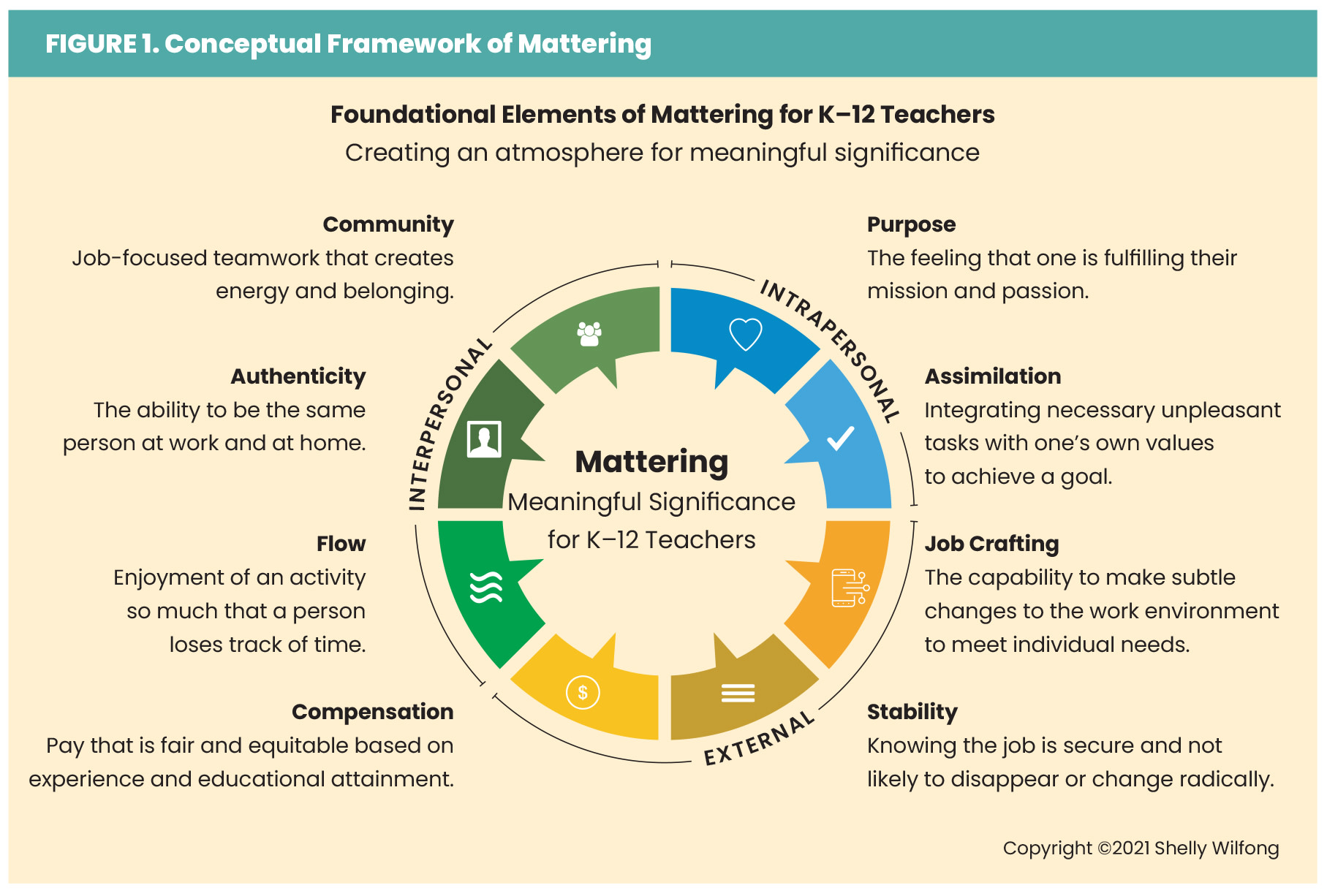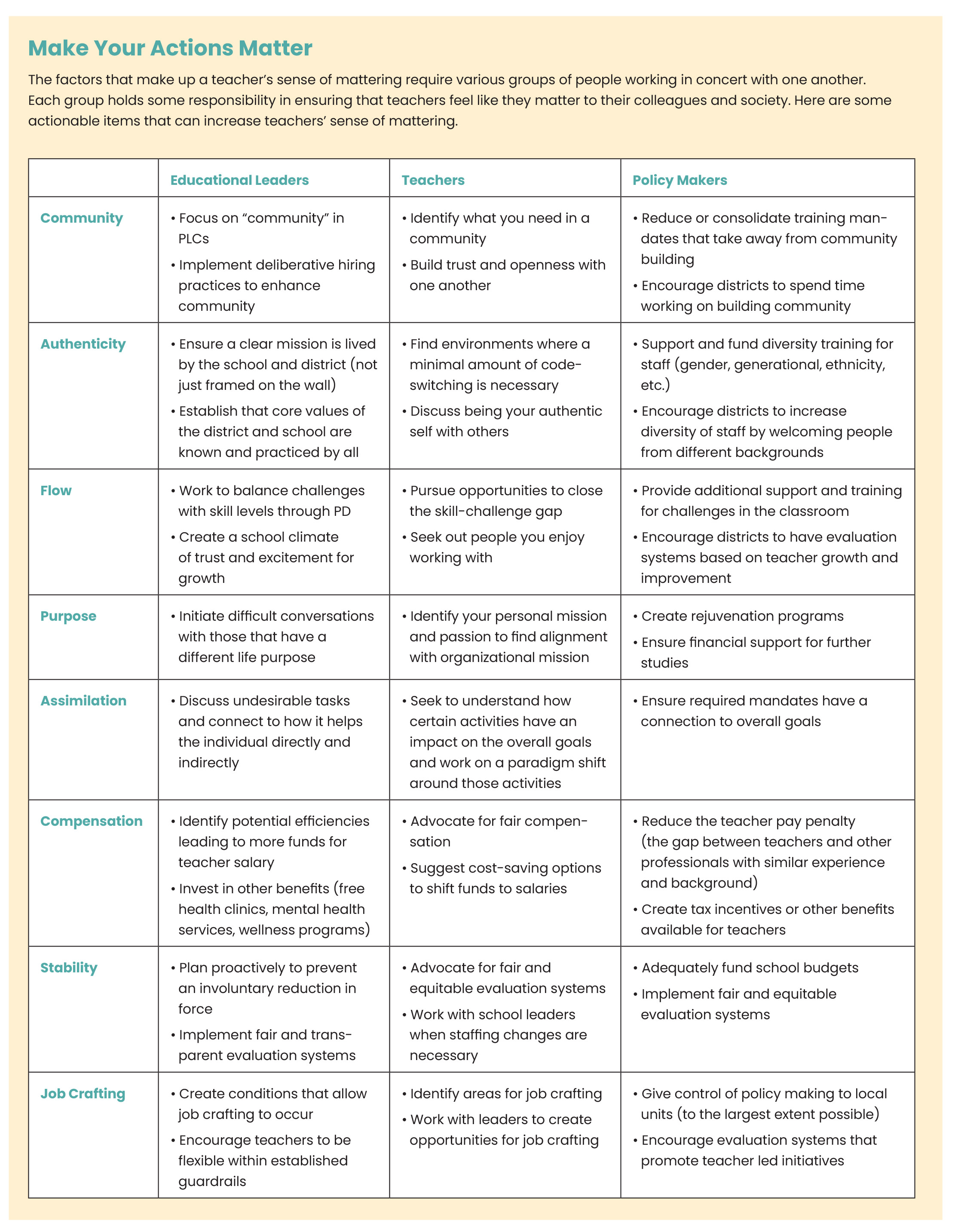People are the backbone of education, yet the challenges in recent years, coupled with frequent external criticism, has defined the teaching profession more as a problem to be managed rather than a calling to be celebrated. Books and articles attempt to address teacher disillusionment and dissatisfaction. Educators have applied influential approaches to their work from books such as Grit by Angela Duckworth (Scribner, 2016), Find Your Why by Simon Sinek (Portfolio, 2017), and Mindset by Carol Dweck (Random House, 2006). But even with the value of these powerful research-to-practice considerations, progress is slow. What if there was something else—a different framework available to identify how teachers can find more teaching satisfaction and enjoyment?
As both practitioners and scholars interested in teacher well-being, we believe that the concept of "mattering" holds the key to collective efficacy in schools. Mattering is the feeling that our actions are significant and we would be missed if we were gone. It is the belief that another person cares about what we want, think, and do, and is concerned with our fate. Elliott et al. (2004) stated that mattering is "the perception that, to some degree and in a variety of ways, we are a significant part of the world around us" (p. 339). It's been shown that a sense of mattering leads to lower stress, while a lack of mattering leads to depression (Taylor & Turner, 2001).
In both our individual and collective research, we've found that mattering strikes at the heart of what teachers today want and need. Shelly's work has identified eight foundational elements of mattering for K–12 teachers, divided into three key areas—interpersonal, intrapersonal, and external—as depicted in Figure 1 (Wilfong, 2021). As a follow up to this research, both of us found a significant relationship between mattering and teachers' sense of collective teacher efficacy (Wilfong & Donlan, 2021). Additionally, our study found a significant relationship between mattering and self-efficacy, change, culture, and organizational health. Understanding these elements of mattering is critical to understanding how leaders can provide an environment where teachers matter, feel more satisfied, and are less likely to leave the profession. Leaders can also help teachers develop a sense of mattering in one another. And teachers can gauge their own sense of mattering to identify what is missing in their own careers and to fill those gaps.
Mattering Interpersonally
Mattering interpersonally involves feelings or interactions with others and includes the following components:
Community
Community is job-focused camaraderie that creates energy and a sense of belonging. One question school leaders and teachers should ask themselves is, Does community exist in our professional learning communities? While student achievement is at the forefront of most PLC work, at times we must put aside our laser-like focus on the students and focus more on whether the adults in the equation feel they matter. For decades, leadership has encouraged teachers to open doors and work together. This is more important now than ever before, because community can enhance the effectiveness of a PLC. It is the force that creates energy and belonging within the group.
Building community in a school requires deliberate actions to ensure success. School leaders who encourage faculty to spend time with data analysis and instructional planning are on the right path; however, they must also allow faculty to spend quality time focused on themselves, connecting and encouraging each other. They can reduce or consolidate training mandates that take away valuable community-building time or offer administrative coverage so teachers can visit each other's classrooms and experience together the joy of students.
Authenticity
School districts that have a clear mission and live their core values can help teachers with authenticity, defined for our purposes as the ability to be the same person at work and at home. Authenticity happens when the institution and individual are aligned, and teachers feel comfortable "being themselves" around others. Of all the elements of mattering, this one can be the hardest to enact because it often requires a shift in school culture and staff attitudes and a willingness among school leaders to implement change.
When districts and schools clearly articulate and implement their vision, teachers can determine if they can be their authentic selves within that structure. This requires school leaders to offer "truth in advertising," especially during the hiring process, with core values at the forefront of transparent decision-making processes, so that teachers can determine if they are the right fit for the school.
Of course, some element of code-switching between one's private and professional life will always be necessary; however, excessive code-switching during the day can take a toll on educators (McCluney et al., 2019). Teaching is emotionally and physically draining without layering in the need to act differently to fit in—or to take on the burden of addressing such issues with administration when leaders aren't aware of their own unconscious biases.
When teachers see the work environment of a school as one where they cannot be their authentic selves, either school leaders did not cast the right talent or they misrepresented their school and expected teachers to assimilate once hired. Schools need to allow teachers some freedom in structuring their classroom climates, but also, within reason, in how they present themselves professionally and personally in terms of appearance and behavior. For newcomers, it helps if principals and teacher leaders message clearly that the school intends to become more like the new teachers rather than expecting the new teachers to become like the school.
Flow
When we enjoy an activity to the point of losing track of time, we experience flow (Csikszentmihalyi, 2009). Flow will most likely happen when we have a balance between our skills and the challenge at hand. To improve flow in teachers' work, school leaders can identify needed skills for the challenges at hand and provide teachers with meaningful professional development to improve those skills.
A sense of mattering leads to lower stress, while a lack of mattering leads to depression.
If teachers do not feel they have the skills necessary to teach certain things, it can be stressful—even tortuous. Time does not "fly by"; it stands still (and not in a good way). When the skill level matches the challenge, however, teachers are more likely to embrace the activity and feel like what they are doing matters.
Mattering Intrapersonally
Mattering intrapersonally involves the internal feelings and actions of an individual and includes the following components:
Purpose
Fulfilling one's passion is key to overall life satisfaction. School leaders must honor teachers' individual passions—but first they must ask about what they are. Sometimes critical conversations are required. Some who pursue teaching careers realize after they start that the job is different from what they expected. Their purpose may be out of sync with the district and the profession. School leaders need to find ways to help these teachers reclaim their why, encourage a re-examination of their mission and passion, or counsel them to find other pursuits. Teachers who do not have a passion for teaching may be fine in their job at first; however, without a purpose, synced with the school's mission, their enthusiasm will wane over time. This lack of enthusiasm will assuredly negatively impact others.
Assimilation
Sometimes we must integrate necessary but unpleasant tasks (recess duty, lunch duty, common-area supervision, making phone calls home) with our own values to achieve a goal (building strong student relationships). This is assimilation. To feel like these tasks matter, teachers must understand why they are necessary for and important to the school's overall goals. If we are school leaders, we must share our perspective and ask teachers for their input.
It goes deeper than just stating that a task has a beneficial outcome. Leaders must connect the dots between task and outcome. A principal can explain to teachers why recess duty is important; however, this does not engender assimilation. Instead, principals should demonstrate through story how teacher interactions with students outside of the classroom can build even stronger relationships in the classroom. Fewer student behavior problems translate to more time and energy in teaching and learning. Connect that how and why.
Mattering Externally
Finally, the third category—mattering externally—involves areas over which the individual teacher often has little direct control and includes the following components:
Job Crafting
Job crafting is the ability to make changes to the work environment to meet individual needs. School leaders who hire well and trust and empower their employees can support job crafting. Administrators need to openly discuss the concept of job crafting with teachers and explicitly create conditions that incentivize a teacher to job craft. Can you allow teachers to choose between a PC or a Mac computer? Or create PLC agendas to fit the needs of the individual groups instead of everyone using the same template? Can you support teachers' individual needs by allowing them to tweak their start and end times as long as those times do not interfere with a staff meeting or other duties? If school leaders have clear guard rails on expectations yet allow for a wide highway of innovation, job crafting can be a powerful tool for teachers while all stay focused on the overall goals of the organization.
Stability
Knowing your job is secure and not likely to change radically is an essential component of mattering. School leaders who reduce staff through retirement attrition and plan for population shifts rather than resorting to forced layoffs or shifts in school or grade-level assignments can help teachers feel stable in their positions. Teachers should also feel enough confidence in this stability to believe they can advocate for fair evaluation systems and other changes to the system. This type of security can lead to a teacher's sense of mattering and work to improve schools and processes over the long run.
Compensation
Finally, to be effective, confident, and happy in their jobs, teachers must have fair and equitable compensation. In 2017, the wage discrepancy between teachers and other professions was more than 18 percent based on experience and education (Allegretto & Mishel, 2018). School leaders can look for ways to cut costs in other areas to lead to more funds for salaries—and they should make sure to ask teachers and staff for ideas and suggestions, because invariably those closest to the classroom can offer key information on resources that are needed and those that are squandered.
We understand that salary schedules and compensation models are often set as part of district-level collective bargaining agreements. This creates a formalized process within which mattering through adequate compensation can be addressed with each negotiations cycle. Savvy negotiators on all sides may agree that one's total compensation package transcends the value of a paycheck, and it could hypothetically include free or low-cost health clinics, mental health services, and/or a robust wellness program that would add the additional benefit of a reduction in health insurance costs. School leaders may have little control over the amount of funds available; however, they can continually identify creative solutions to stretch the budget and work together on things that matter.
Make It Matter
For all the discussion surrounding teacher wellness, stress levels, and career satisfaction, little improvement in those areas has occurred in recent years. Teachers want to feel they matter, both individually and as part of a larger team that has the capacity to make a difference. Teachers also want to feel they are significant to others in meaningful ways.
When teachers understand the construct and elements of mattering, they can also identify which pieces may be missing in their careers and pursue remedies to increase their job satisfaction. This can have direct and tangential influences on teaching, learning, whole-educator care, and student success—and that, perhaps, is what truly matters in the end.
Reflect and Discuss
➛ Which components of mattering do you most identify with?
➛ Are there any of the components of mattering that you think are lacking in your job or self? How might you work to develop them or advocate for yourself?
➛ How do you think a teacher's sense of mattering can help or hinder a student's learning experience?









